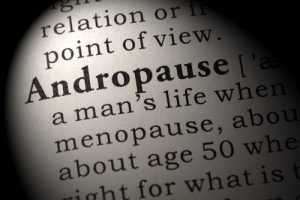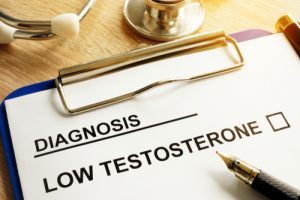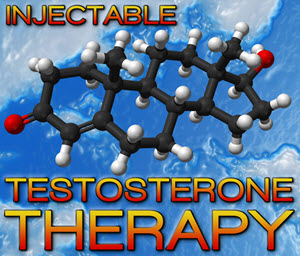Video Link: https://vimeo.com/293252089
Video Download: Click Here To Download Video
Video Stream: Click Here To Stream Video
Video Link: https://vimeo.com/293252374
Video Download: Click Here To Download Video
Video Stream: Click Here To Stream Video
Testosterone Therapy and Androgen Deficiency Guide
Testosterone Deficiency goes by a number of names, including Low-T and Hypogonadism. When Low-T is the result of the aging process, it is known as  Andropause or Age-Related Testosterone Deficiency. As a whole, Low-T is a syndrome, which means that it represents a collection of symptoms rather than a simply definable medical condition with a consistent cause.
Andropause or Age-Related Testosterone Deficiency. As a whole, Low-T is a syndrome, which means that it represents a collection of symptoms rather than a simply definable medical condition with a consistent cause.
A number of issues can lead to Low-T, from genetic defects to surgery and radiation-related to injury and cancer. It is also often simply the result of the body slowly losing its ability to produce sufficient Testosterone as a factor of age.
For men with Testosterone Deficiency, Low-T Therapy is a highly effective way to restore normalcy and proper hormone balance for the patient. Testosterone is often used for other purposes, such as anti-aging, appearance, performance enhancement, and strength training, but these uses are not approved by the FDA.
Testosterone is not an Anti-Aging drug, but, for patients with Testosterone Deficiency, Bio-Identical Low-T Treatment can help mitigate a number of symptoms that are commonly associated with the aging process.
What Are the Symptoms of Testosterone Deficiency?
Low-T affects male health both on a physical and psychological level, and there are a number of symptoms associated with the condition. The following is a list of symptoms of Testosterone Deficiency:
Depression
Anxiety
Fatigue
Increased Development of Breast Tissue
Infertility and Low Sperm Count
Sexual Dysfunction
Loss of Sex Drive
Loss of Muscle Mass
Weight Gain
Osteoporosis
Testicular shrinkage
How Is Low-T Diagnosed?
As of today, there is still some debate over the exact Testosterone Thresholds regarding Testosterone Deficiency, but what is agreed upon is that the two most important factors with regard to the diagnosis of Hypogonadism and Andropause are both the presence of clinically low Testosterone Levels and the display of symptoms associated with the condition.
important factors with regard to the diagnosis of Hypogonadism and Andropause are both the presence of clinically low Testosterone Levels and the display of symptoms associated with the condition.
Many men function just fine with lower Testosterone Production, while others are much more sensitive to their body's changes.
Testosterone Deficiency Diagnosis requires three stages: Patient history, Physical, and Blood Test
Testosterone Patient History
A big part of Low-T diagnosis and approval for treatment has to do with your past health history, personal, medical, and genetic. It's important for your prescribing hormone doctor to understand if you went through any issues in your past, whether during puberty or some other period of time, where you experienced issues that are related to Low-T.
Also, your personal life is very important, because men that are in unsatisfactory relationships or are under a great deal of stress may be displaying symptoms related to Testosterone Deficiency as a result of environmental and personal factors rather than as a result of a physiological deficiency.
Of course, hereditary history is also important. Men with a high risk of prostate cancer, for example, will experience a higher risk profile associated with therapy than those that do not have such a history. Also, if other men in your family have suffered from Low-T in the past, it provides evidence that you yourself may be in need.
There are also a number of quality of life issues that cannot be easily quantified through physical evaluation, such as happiness, libido, and personal satisfaction, which are also best revealed through this personal history, either in written form or discussed with your prescribing hormone doctor.
Low-T Physical
Beyond self-evaluation, you will also need to be physically evaluated by a physician.
He or she will be able to collect health data which will help them prescribe the right dose, and certain symptoms can be discerned through the physical evaluation, including reduced penis-size, testicular shrinkage, breast enlargement, and diminished body hair.
Low-T Blood Test
Finally, if signs suggest that you may be suffering from Testosterone Deficiency, your physician will take a blood sample for testing. A number of tests may be  taken to evaluate your health and hormone balance, but the most important test is your Free and Total Testosterone Test.
taken to evaluate your health and hormone balance, but the most important test is your Free and Total Testosterone Test.
This test is usually taken in the morning because it is when we first wake up that Testosterone Concentrations are at their peak.
It's important that this test is taken while you are free from illness and any medication that is not taken for a chronic condition because these issues can temporarily suppress Testosterone.
What Is Considered Normal When It Comes to Low-T?
As we mentioned earlier, there is still some debate, but the generally accepted rule is that normal Testosterone Levels in the blood are considered between 300 and 1000 nanograms per deciliter.
Many clinics go by different guidelines and it is ultimately up to your prescribing physician to establish his or her own personal guidelines dependent upon the patients and the symptoms.
Who Can Benefit from Testosterone Therapy?
Men that are suffering from health issues as a direct result of their diminished Testosterone Levels can benefit from Testosterone Treatment, as long as the benefits of treatment outweigh the risks.
For most patients with Low-T, Testosterone Therapy with Injections, Patches, Creams, or Gels are a low-risk treatment that provides real benefits, but certain critical groups may need to avoid therapy or at least understand the risks associated with treatment.
Who Should Avoid Low-T Treatment for Hypogonadism?
There are some at-risk groups that should not undergo Testosterone Restoration. These include:
Men that are interested in bearing children – Testosterone Treatment suppresses the ability to produce sperm. This doesn't have an adverse effect on health, but it does limit fertility. Testosterone with HCG can promote the production of sperm during Low-T Treatment and is an option, however.
Men the Prostate or Breast Cancer – Testosterone Therapy does not cause these forms of cancer, but it can exacerbate existing cancers, because prostate cancer feeds off of Testosterone, and breast cancer feeds off of Estrogen that is sometimes produced as a byproduct of Testosterone Treatment.
Men with High PSA Levels Prior to Treatment – Elevated PSA is a sign of prostate cancer risk under normal circumstances. PSA is produced as a result of Testosterone Therapy, but under these special circumstances, increased PSA Levels are benign.
Men with Elevated Red Blood Cell Counts – Testosterone can increase RBC Count which is associated with increased risk of cardiovascular complications. If the patient experiences increased RBC as a result of treatment, it can be effectively treated via blood donation.
Obstructive Sleep Apnea – Testosterone can exacerbate existing sleep apnea if not under treatment
Men That Are Suffering from Heart Failure Which Isn't Effectively Controlled
Patients with Significant Prostate Enlargement Prior to Treatment
Patients that are potentially at high risk of Prostate Cancer
What is the Goal of Low-T Treatment?
It's important to understand that the ultimate goal of Testosterone Restoration isn't to abnormally elevate Testosterone Concentrations, but simply to restore Testosterone Levels back to a normal state.
Testosterone Abuse has an elevated risk of complications because it involves increasing Testosterone Levels to an abnormally high state which puts pressure on normal hormone balance.
Every patient will have his or her own goals with regard to Testosterone Therapy. For young patients, it will be to encourage puberty, for example. For men with Andropause, the goals are generally multifaceted.
These men are looking to safeguard their health, as well as preserve their masculine characteristics. Testosterone Therapy can improve cardiovascular health, increase Bone Mineral Density, improve beard thickness and growth, maintain the depth of the voice, increase muscle mass, burn fat, and preserve sexual health!
What Options Are Available With Regard to Testosterone Replacement?
There are a number of options available to the patient when it comes to treatment, including:
Testosterone Creams – Topical Application Daily
Testosterone Gels – Topical Application Daily
Testosterone Injections – Periodic Injections, most often prescribed Bi-Weekly
Testosterone Implants – Outpatient Surgical Procedure Provides 3-5 Months of Testosterone
Testosterone Buccal Tablets – Applied to Gums Daily
How Do I Get The Most Out Of Testosterone Therapy?
In order to maximize the benefits of treatment, it is important to follow your prescription exactly as outlined and keep an open dialogue with your prescribing physician regarding any issues that you may experience during treatment.
Also, it's important to set up appointments with your hormone doctor once every six months to one year in order to make sure that your body is responding to treatment ideally and without side-effects or unnecessary risk.
Different patients also respond to different forms of Low-T Treatment in their  own unique way, so talk to your doctor about any specific issues that you experience such as skin irritation or patterns of physiological imbalance, because you may be responding in a negative way to the specific treatment you were prescribed and would likely benefit from changing your route of administration.
own unique way, so talk to your doctor about any specific issues that you experience such as skin irritation or patterns of physiological imbalance, because you may be responding in a negative way to the specific treatment you were prescribed and would likely benefit from changing your route of administration.
Finally, Testosterone can provide benefits even without changing your lifestyle, incorporating a healthy diet and exercise plan to your Testosterone Regimen will improve the way your body responds to treatment significantly!
Contact Us Today For A Free Consultation

- Adverse Effects of Testosterone Therapy in Adult Men: A Systematic Review and Meta-Analysis [Last Updated On: July 2nd, 2024] [Originally Added On: June 4th, 2010]
- Low Testosterone Levels, Foods That Increase Testosterone Levels wwwSelf-Improvement-Bible.com [Last Updated On: November 12th, 2023] [Originally Added On: May 30th, 2011]
- Low Testosterone in Men: The Next Big Thing in Medicine! - Abraham Morgentaler, MD [Last Updated On: May 7th, 2023] [Originally Added On: June 3rd, 2011]
- How To Determine Testosterone Levels By Looking At Your Ring Finger [Last Updated On: December 7th, 2017] [Originally Added On: June 30th, 2011]
- Prolab Horny Goat Weed Testosterone Booster Supplement Review [Last Updated On: November 23rd, 2023] [Originally Added On: July 19th, 2011]
- The Healthy Skeptic: Products make testosterone claims [Last Updated On: August 13th, 2024] [Originally Added On: September 11th, 2011]
- How To Naturally Increase Testosterone [Last Updated On: November 21st, 2023] [Originally Added On: September 28th, 2011]
- Testosterone Production - Video [Last Updated On: November 25th, 2024] [Originally Added On: November 20th, 2011]
- Testosterone makes us less cooperative and more egocentric, study finds [Last Updated On: January 23rd, 2018] [Originally Added On: February 1st, 2012]
- Testosterone makes us less cooperative and more egocentric [Last Updated On: January 24th, 2018] [Originally Added On: February 1st, 2012]
- Too much testosterone makes for bad decisions, tests show [Last Updated On: April 30th, 2025] [Originally Added On: February 1st, 2012]
- Today in Research: Testosterone's Negative Effects; Diet Soda Death [Last Updated On: January 2nd, 2018] [Originally Added On: February 2nd, 2012]
- Testosterone drives ego, trips cooperation [Last Updated On: December 2nd, 2017] [Originally Added On: February 4th, 2012]
- FDA approves BioSante/Teva's testosterone gel [Last Updated On: April 28th, 2025] [Originally Added On: February 15th, 2012]
- 'Manly' Fingers Make For Strong Jawline in Young Boys [Last Updated On: December 1st, 2017] [Originally Added On: February 15th, 2012]
- Teva, BioSante Win U.S. Approval for Testosterone Therapy [Last Updated On: December 10th, 2017] [Originally Added On: February 15th, 2012]
- BioSante Gains on Approval of Testosterone Gel: Chicago Mover [Last Updated On: January 8th, 2018] [Originally Added On: February 16th, 2012]
- BioSante soars following drug approval from FDA [Last Updated On: December 26th, 2017] [Originally Added On: February 16th, 2012]
- Antibodies, Not Hard Bodies: The Real Reason Women Drool Over Brad Pitt [Last Updated On: December 24th, 2017] [Originally Added On: February 21st, 2012]
- Almark Publishing Releases Book From Mark Rosenberg, M.D. Revealing Natural Discoveries Associated With Low ... [Last Updated On: May 3rd, 2025] [Originally Added On: February 28th, 2012]
- Testosterone Replacement Clinic Comes to Kansas City with Potential to Help Thousands of Men [Last Updated On: May 2nd, 2025] [Originally Added On: March 1st, 2012]
- Study examines the relative roles of testosterone and its metabolite, dihydrotestosterone in men [Last Updated On: December 2nd, 2017] [Originally Added On: March 7th, 2012]
- The Role of 5{alpha}-Reductase Inhibition in Men Receiving Testosterone Replacement Therapy [Editorial] [Last Updated On: December 21st, 2017] [Originally Added On: March 7th, 2012]
- Effect of Testosterone Supplementation With and Without a Dual 5{alpha}-Reductase Inhibitor on Fat-Free Mass in Men ... [Last Updated On: January 3rd, 2018] [Originally Added On: March 7th, 2012]
- Why We Like Men Who Can Keep Their Cool [Last Updated On: December 30th, 2017] [Originally Added On: March 7th, 2012]
- Testosterone And Heart Health [Last Updated On: May 1st, 2025] [Originally Added On: March 10th, 2012]
- Your Life on Testosterone: Overly Sure of Yourself, Unwilling to Listen [Last Updated On: November 25th, 2018] [Originally Added On: March 15th, 2012]
- Mayo Clinic-TGen study role testosterone may play in triple negative breast cancer [Last Updated On: December 8th, 2017] [Originally Added On: March 23rd, 2012]
- A dose of testosterone might not cure what ails you [Last Updated On: January 23rd, 2018] [Originally Added On: March 25th, 2012]
- Green tea could aid athletes hide testosterone doping [Last Updated On: December 16th, 2017] [Originally Added On: March 25th, 2012]
- TGen Study Role Testosterone May Play in Triple Negative Breast Cancer [Last Updated On: December 6th, 2017] [Originally Added On: March 26th, 2012]
- Testosterone low, but responsive to competition, in Amazonian tribe [Last Updated On: January 23rd, 2018] [Originally Added On: March 28th, 2012]
- Competition-linked bursts of testosterone are fundamental aspect of human biology, study of Amazonian tribe suggests [Last Updated On: December 25th, 2017] [Originally Added On: March 28th, 2012]
- Playing football boosts testosterone levels by 30 percent! [Last Updated On: February 4th, 2024] [Originally Added On: March 28th, 2012]
- Testosterone low, but responsive to competition, in Amazonian tribe -- with slideshow [Last Updated On: December 9th, 2017] [Originally Added On: March 28th, 2012]
- The benefits of testosterone pellet therapy [Last Updated On: January 24th, 2018] [Originally Added On: March 29th, 2012]
- Low testosterone levels cause health woes [Last Updated On: November 25th, 2018] [Originally Added On: March 30th, 2012]
- Heart Failure Patients Getting Relief from Testosterone Supplements [Last Updated On: May 5th, 2025] [Originally Added On: April 21st, 2012]
- Study Finds Fatherhood Suppresses Testosterone [Last Updated On: May 4th, 2025] [Originally Added On: May 3rd, 2012]
- Low testosterone levels could raise diabetes risk for men [Last Updated On: January 26th, 2018] [Originally Added On: May 5th, 2012]
- Why low testosterone may increase your risk of diabetes [Last Updated On: November 25th, 2024] [Originally Added On: May 5th, 2012]
- Diabetes link to low testosterone [Last Updated On: November 25th, 2024] [Originally Added On: May 5th, 2012]
- Testosterone Linked to Weight Loss in Obese Men [Last Updated On: January 2nd, 2018] [Originally Added On: May 11th, 2012]
- Testosterone may help weight loss [Last Updated On: November 25th, 2024] [Originally Added On: May 11th, 2012]
- Testosterone-fuelled infantile males might be a product of Mom's behaviour [Last Updated On: December 25th, 2017] [Originally Added On: May 11th, 2012]
- Testosterone-fueled infantile males might be a product of Mom's behavior [Last Updated On: January 6th, 2018] [Originally Added On: May 11th, 2012]
- Testosterone supplements may help obese men lose weight [Last Updated On: January 5th, 2018] [Originally Added On: May 11th, 2012]
- Testosterone supplements 'can help men lose their middle-aged spread' [Last Updated On: November 25th, 2024] [Originally Added On: May 12th, 2012]
- Some doctors question safety of testosterone replacement therapy [Last Updated On: January 20th, 2018] [Originally Added On: May 15th, 2012]
- Health Canada Approves New Testosterone Topical Solution for Men [Last Updated On: May 15th, 2025] [Originally Added On: May 15th, 2012]
- Environment trumps genes in testosterone levels, study finds [Last Updated On: May 8th, 2025] [Originally Added On: May 15th, 2012]
- Global Testosterone Replacement Therapy (TRT) Industry [Last Updated On: May 7th, 2025] [Originally Added On: May 21st, 2012]
- Testosterone Fuels Boom, Swindler Sows Panic: Top Business Books [Last Updated On: January 13th, 2018] [Originally Added On: June 2nd, 2012]
- Increase in testosterone drug use [Last Updated On: April 12th, 2018] [Originally Added On: June 4th, 2012]
- Testosterone Promotes Agression Automatically [Last Updated On: January 29th, 2018] [Originally Added On: June 9th, 2012]
- Testosterone shown to help sexually frustrated women [Last Updated On: January 27th, 2018] [Originally Added On: June 9th, 2012]
- Research and Markets: Testosterone Replacement Therapy (TRT) - Global Strategic Business Report [Last Updated On: December 23rd, 2017] [Originally Added On: June 12th, 2012]
- Proposed testosterone testing of some female olympians challenged by Stanford scientists [Last Updated On: January 30th, 2018] [Originally Added On: June 14th, 2012]
- Testosterone Makes Bosses Into Jerks, Says Paul Zak [Last Updated On: January 8th, 2018] [Originally Added On: June 14th, 2012]
- Testosterone Therapy: A Misguided Approach to Erectile Dysfunction (ED) [Last Updated On: May 10th, 2025] [Originally Added On: June 20th, 2012]
- New drugs, new ways to target androgens in prostate cancer therapy [Last Updated On: January 8th, 2018] [Originally Added On: June 20th, 2012]
- Long-term testosterone treatment for men results in reduced weight and waist size [Last Updated On: January 19th, 2018] [Originally Added On: June 23rd, 2012]
- Declining testosterone levels in men not part of normal aging, study finds [Last Updated On: December 27th, 2017] [Originally Added On: June 23rd, 2012]
- Low testosterone not normal part of aging [Last Updated On: December 22nd, 2017] [Originally Added On: June 25th, 2012]
- Testosterone Does Not Necessarily Wane With Age [Last Updated On: December 6th, 2017] [Originally Added On: June 25th, 2012]
- Overweight men can boost low testosterone levels by losing weight [Last Updated On: December 10th, 2017] [Originally Added On: June 25th, 2012]
- Testosterone-replacement therapy improves symptoms of metabolic syndrome [Last Updated On: January 14th, 2018] [Originally Added On: June 26th, 2012]
- Testosterone therapy takes off pounds [Last Updated On: December 11th, 2017] [Originally Added On: June 26th, 2012]
- Weight loss may boost men's testosterone [Last Updated On: May 9th, 2025] [Originally Added On: June 27th, 2012]
- Low Testosterone? Study finds age may not be to blame [Last Updated On: May 12th, 2025] [Originally Added On: July 1st, 2012]
- Do you have low testosterone? [Last Updated On: December 15th, 2017] [Originally Added On: July 8th, 2012]
- Wall Streeters Buying Testosterone for an Edge [Last Updated On: May 11th, 2025] [Originally Added On: July 12th, 2012]
- Beefy Wall Street Traders rub on testosterone [Last Updated On: February 20th, 2024] [Originally Added On: July 12th, 2012]
- Tale of two runners exposes flawed Olympic thinking [Last Updated On: December 23rd, 2024] [Originally Added On: July 19th, 2012]
- Genetic markers for testosterone and estrogen level regulation identified [Last Updated On: January 6th, 2018] [Originally Added On: July 20th, 2012]
- BUSM researchers identify genetic markers for testosterone, estrogen level regulation [Last Updated On: December 18th, 2017] [Originally Added On: July 20th, 2012]
- DRS. OZ AND ROIZEN: How to reap the benefits of normal testosterone levels [Last Updated On: December 23rd, 2024] [Originally Added On: July 21st, 2012]
- How Testosterone Drives History [Last Updated On: December 24th, 2024] [Originally Added On: July 22nd, 2012]
- Testosterone replacement is "fountain of youth" for men [Last Updated On: January 3rd, 2018] [Originally Added On: July 27th, 2012]
- Pill for low testosterone in men heads for phase II clinical trials [Last Updated On: December 31st, 2017] [Originally Added On: August 2nd, 2012]
Word Count: 1481




















